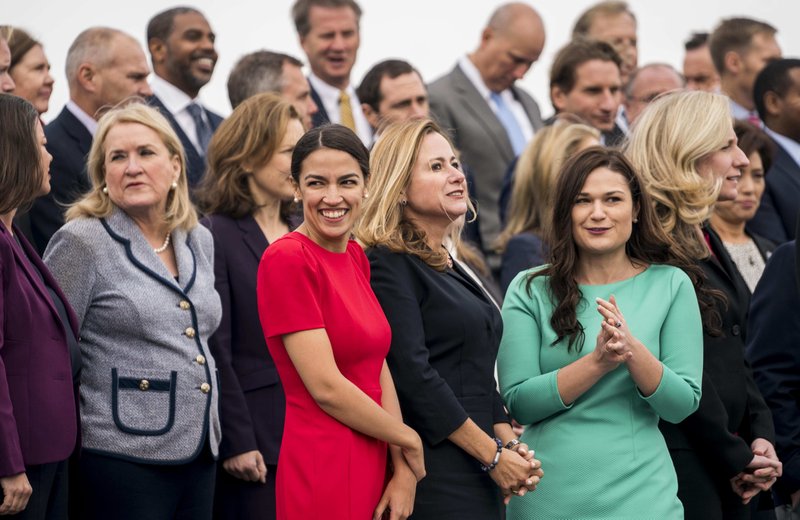Alexandria Ocasio-Cortez has emerged as the unofficial leader of a class of House Democrats whose diversity and ties to the progressive left will shape the party as it targets President Donald Trump and works to clarify its message ahead of the 2020 elections.
Incoming members have quickly exerted their influence on Capitol Hill since the midterm elections, with progressives bolstering Minority Leader Nancy Pelosi's bid for speaker by declining to endorse an opposition movement led by centrist Democrats.
Yet while Ocasio-Cortez, D-N.Y., and her liberal peers have chosen so far not to aggravate the leadership dispute, their relative youth, energy and progressive bent raised the specter of future conflict as centrists and liberals fight for control of the party's agenda for the next two years.
"This is probably one of the most entrepreneurial, innovative and restless freshmen classes that we've seen in recent memory," said former Rep. Steve Israel, D-N.Y., who ran the Democratic Congressional Campaign Committee from 2011 to 2015. "What I would caution them to do is to keep their eye on who the problem is -- and the problem is the Trump administration."
The threat of fresh divisions among House Democrats became clear after Ocasio-Cortez beat Rep. Joseph Crowley, chairman of the House Democratic Caucus, in a June primary in their Queens-based congressional district. The upset drew national attention. Ocasio-Cortez, a democratic socialist, went on to campaign with Sen. Bernie Sanders, I-Vt., for like-minded candidates around the country and to generate a following online.
The midterm election produced a powerful class of freshmen Democrats that has been riven by the speakership race, as centrists from red and purple districts express opposition to Pelosi, D-Calif., and progressives back her or conspicuously decline to join the insurgents.
Ocasio-Cortez, at 29 the youngest woman ever elected to Congress, threw support behind the would-be speaker during a recent live video on Instagram in which she told an audience of nearly 5,000 viewers that opposition to Pelosi was coming from her right flank.
She repeated this argument Wednesday on Twitter.
"All the challenges to Leader Pelosi are coming from her right, in an apparent effort to make the party even more conservative and bent toward corporate interests. Hard pass," she wrote. "So long as Leader Pelosi remains the most progressive candidate for Speaker, she can count on my support."
Ocasio-Cortez won her primary after criticizing establishment Democrats for failing to push bold policy solutions to climate change, income inequality and rising health care costs. She received support from progressive groups such as Justice Democrats, which also endorsed the House candidacies of Ilhan Omar, D-Minn., Rashida Tlaib, D-Mich., and Ayanna Pressley, D-Mass.
These three women each broke barriers with their victories -- Omar and Tlaib are the first two Muslim women elected to Congress, and Pressley is the first black woman elected to Congress from Massachusetts. Together, the incoming freshmen Democrats are historically diverse, with women and members of minority groups making up a majority of the group. Eighteen newly elected House Democrats are under age 40 -- three times the number who served this term.
"I think the women who won in the House, particularly Ms. Ocasio-Cortez, are magnificent. They will be heard," said former U.S. Rep. Lynn Woolsey, D-Calif., a co-leader of the Congressional Progressive Caucus from 2006 to 2010.
Woolsey urged the newcomers to embrace Pelosi, who she described as a true progressive.
"She can teach them if they will listen, and she will listen to them," Woolsey said.
While Pelosi has managed to avoid serious opposition from the progressive freshmen, they are expected to put pressure on her to move the House's agenda to the left.
Rep. Jim Himes, D-Conn., who leads the moderate New Democrat Coalition, said the party should be "very strategic to avoid" votes that put pressure on vulnerable centrists. He pointed to the progressive talking point of abolishing Immigration and Customs Enforcement as unhelpful.
"The thing that annoys me about 'Abolish ICE' is that it became a political liability for some of our most vulnerable members, and it wasn't even a real policy proposal," Himes said. "Why put it out there in a form that makes life very difficult for people in redder areas?"
On the left, Ocasio-Cortez's early criticism of her future colleagues has been celebrated for identifying what some progressives believe their leaders need to encourage to keep momentum -- steady, aggressive direct action, even if it makes some people uncomfortable.
Ocasio-Cortez and her fellow Democratic newcomers' already sizable fan base among younger voters and members of minority groups will give particular weight to their endorsements in the next Democratic presidential primary, while their fluency on social media -- a radical shift from the staid, prepackaged style used by most politicians -- could set the bar for how candidates generate interest and support online.
As the group's most prominent member, Ocasio-Cortez is helping to address the lack of diversity and advancing age of leaders on the left, argued Sean McElwee, the co-founder of the Data for Progress think tank.
"She's a progressive leftist who's not a 77-year-old white guy," said McElwee. "People look at Ocasio-Cortez and they identify with her."
Information for this article was contributed by Mike DeBonis of The Washington Post.
A Section on 11/25/2018
